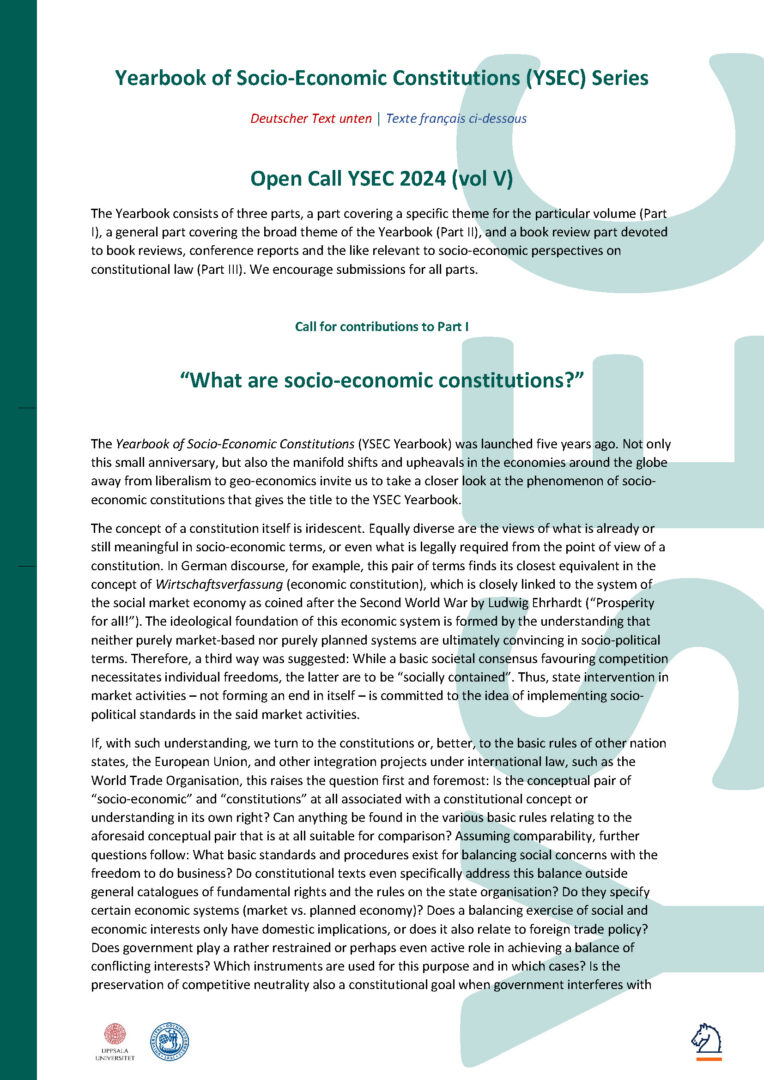Why Publishing Your Work in YSEC?
The Yearbook of Socio-Economic Constitutions (YSEC) offers an original perspective on law by focusing on the fundamental rules governing our economic and social lives (i.e. the socio-economic constitutions) at the local, national, and international levels.
Our mission is to combine the solidity and rigor of a classical yearbook with the excitement of a respected journal, keeping a rigorous focus on doctrinal legal treatment of issues that socio-economic constitutions are facing in today’s globalized context, while at the same time remaining open to neighbouring disciplines to the extent that these inform the analysis. Each volume contains a carefully curated selection of high-quality writings covering a current theme and its socio-economic constitutional dimensions. Thus, each contribution to a YSEC volume constitutes a unique singular addition to the research topic as well as a vital part of a comprehensive volume in a topical research field.
Further, the YSEC provides authors with a clear, reliable, and transparent production. We work closely with each of the authors throughout the production phases in order to secure that the production timeline is respected while the highest academic standards are maintained. Our cooperation with Springer gives us the possibility to grant our authors’ contributions the publicity they deserve. As soon as the contributions are finalized, e-publication is available via the Springer website, which means that our authors do not need to wait for the published volume to disseminate their work.
Once complete, each volume of YSEC is presented and promoted energetically by the Editorial team and Springer. All finalized chapters are made available directly online by Springer and they are also reachable via the YSEC website. The high-quality printed volume is presented at an annual special book launch arranged by us, and broadcast on various traditional and social media channels.
YSEC is listed at the Norwegian Register for Scientific Journals, Series and Publishers.
YSEC Volume V (2024)
Download Open Call
English text │ Deutscher Text │Texte français
Open Call YSEC 2024 (vol V)
The Yearbook consists of three parts, a part covering a specific theme for the particular volume (Part I), a general part covering the broad theme of the Yearbook (Part II), and a book review part devoted to book reviews, conference reports and the like relevant to socio-economic perspectives on constitutional law (Part III). We encourage submissions for all parts.
Call for contributions to Part I
“What are socio-economic constitutions?”
The Yearbook of Socio-Economic Constitutions (YSEC Yearbook) was launched five years ago. Not only this small anniversary, but also the manifold shifts and upheavals in the economies around the globe away from liberalism to geo-economics invite us to take a closer look at the phenomenon of socio-economic constitutions that gives the title to the YSEC Yearbook.
The concept of a constitution itself is iridescent. Equally diverse are the views of what is already or still meaningful in socio-economic terms, or even what is legally required from the point of view of a constitution. In German discourse, for example, this pair of terms finds its closest equivalent in the concept of Wirtschaftsverfassung (economic constitution), which is closely linked to the system of the social market economy as coined after the Second World War by Ludwig Ehrhardt (“Prosperity for all!”). The ideological foundation of this economic system is formed by the understanding that neither purely market-based nor purely planned systems are ultimately convincing in socio-political terms. Therefore, a third way was suggested: While a basic societal consensus favouring competition necessitates individual freedoms, the latter are to be “socially contained”. Thus, state intervention in market activities – not forming an end in itself – is committed to the idea of implementing socio-political standards in the said market activities.
If, with such understanding, we turn to the constitutions or, better, to the basic rules of other nation states, the European Union, and other integration projects under international law, such as the World Trade Organisation, this raises the question first and foremost: Is the conceptual pair of “socio-economic” and “constitutions” at all associated with a constitutional concept or understanding in its own right? Can anything be found in the various basic rules relating to the aforesaid conceptual pair that is at all suitable for comparison? Assuming comparability, further questions follow: What basic standards and procedures exist for balancing social concerns with the freedom to do business? Do constitutional texts even specifically address this balance outside general catalogues of fundamental rights and the rules on the state organisation? Do they specify certain economic systems (market vs. planned economy)? Does a balancing exercise of social and economic interests only have domestic implications, or does it also relate to foreign trade policy? Does government play a rather restrained or perhaps even active role in achieving a balance of conflicting interests? Which instruments are used for this purpose and in which cases? Is the preservation of competitive neutrality also a constitutional goal when government interferes with the behaviour of competing undertakings? If so, what instruments are available to government for this purpose?
The problems just raised are only exemplary and by no means exhaustive. In addition, this Call deliberately does not specify a certain legal discipline or methodological orientation of a contribution. Contributions that are more dogmatically linked to a specific legal system or individual legal instruments are just as welcome as papers on legal history and comparative law or those that address individual areas of law, sources of law or specific legal problems in an exemplary manner. This call is also open to contributions that link economic and legal issues as well as intradisciplinary contributions that aim to identify lines of connection between public and private law. Through regional integration and globalisation of the economy, states have agreed to restrictions of their sovereign rights in the interest of promoting trade. Therefore, the question of socio-economic constitutions is also to be answered from an EU and international law perspective and corresponding contributions are expressly encouraged.
Call for contributions to Parts II and III
YSEC’s general part (Part II) focuses on any relevant current developments in the broader field of the Yearbook’s coverage, which can be summarized as contemporary analysis of the challenges that constitutional frameworks face in balancing fundamental economic and social interests at the local, national, regional, and global level. Prospective contributors may consider that the Yearbook’s mission is to present current research on legal issues of socio-economic constitutional importance without limitations regarding approaches and theoretical perspectives, while establishing a forum for doctrinal legal treatment of the questions that various socio-economic constitutions are faced with in today’s globalized context.
For Part III we warmly welcome proposals for book reviews, conference reports, and the like.
(Extended) Deadline for proposals (for all three parts of YSEC 2024 (vol V)): 15 September 2023.
Proposals of no more than 500 words shall be sent to editors@ysec-yearbook.eu. Successful applications will be notified by end of September 2023.
Conference
Assumed that sufficient funding can be secured, it is planned to organise an international conference on the topic of Volume 5 of the Yearbook – „What are socio-economic constitutions?“ (working title) – in Speyer / Germany at the end of March 2024. For this purpose, particularly promising contributions will be selected from among the accepted proposals and invited to Speyer. In this case the production schedule may deviate from the general one below in the sense that peer review comments will be provided earlier and that a near to final version will be expected at the time of conference.
Download Open Call
English text │ Deutscher Text │Texte français
End of May 2023
The call for papers is opened and published on the website.
15th September 2023, midnight
(Extended) Deadline for submitting proposals.
End of September 2023
Selection of authors and invitation to submit chapters.
Enf December 2023, midnight
Selected authors submit their chapters. Chapters are sent straight to peer review.
End of February 2023, estimated
Deadline for submission of peer reviews. The authors receive their peer-reviewed contributions immediately afterwards.
30th June 2024, midnight
Deadline for final submission of the revised chapters by the authors.
July 2024
Subject to a final style check by the editors, the chapters and other contributions are submitted to Springer.
September – December 2024
Springer publishes the chapters and other contributions online as soon as they are ready.
December 2024
The full YSEC volume is published in hardcopy before the end of the year.

